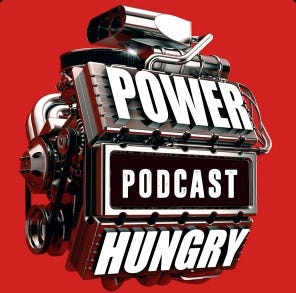Biden's four big grid challenges; Lomborg on the podcast
A brief TGIF note
Two items today:
My Forbes piece on Joe Biden's plans to overhaul the electric grid
On the Power Hungry Podcast, Bjorn Lomborg talks with me about False Alarm
Decarbonizing our continent-spanning electric grid
The Biden administration is planning major policy changes on energy and climate change. On Monday morning, I published this piece in Forbes, which looks at the electricity-related issues. As a candidate, Biden pledged to overhaul America’s electric grid so that it relies solely on “clean” electricity by 2035. But overhauling our most biggest, most important and most complex energy network – and doing so in just 15 years — is easier said than done. I wrote:
Decarbonizing our continent-spanning electric grid will require grappling with four big challenges: cost, keeping nuclear plants open, replacing natural gas in the power sector, and the ongoing land-use conflicts over renewables.
The most important issue is cost. Who will pay for all of the needed investment? Biden put the cost of his energy plan at $2 trillion. But last year, the energy consultancy Wood Mackenzie estimated that “full decarbonization of the U.S. power grid” would cost about $4.5 trillion. The firm said that “From a budgetary perspective, the cost is staggering at US$35,000 per household – nearly US$2,000 per year if assuming a 20-year plan.”
For decades, the Democratic Party has identified itself as the champion of the poor and the working class. Completely decarbonizing the electric grid will require spending trillions of dollars and those costs will be passed along to consumers in the form of higher electricity prices and/or higher taxes. If Democrats want to reduce inequality and provide better opportunities for the poor and the middle class, they will have to balance their desire for action on climate change with the real world of electricity rates and grid reliability.
I will be writing more in the future about Biden's plans as well as other state-based climate policies and their likely financial impacts on the poor and the middle class. As I explained in my last email blast, and in the November 1 piece I published in Forbes about the Latino backlash against California's climate regulations, the regressive nature of many of these policies has already emerged as a key friction point. Stay tuned.

Bjorn Lomborg joins me on the podcast to talk about False Alarm
On Tuesday, we – that's me and the podcast's producer, Tyson Culver – released a new episode of The Power Hungry Podcast that features Bjorn Lomborg, the president of the Copenhagen Consensus Center, a think tank that “researches the smartest ways to do good.” Bjorn and I talked about his new book: False Alarm: How Climate Change Panic Costs Us Trillions, Hurts the Poor, and Fails to Fix the Planet. Lomborg doesn't doubt that climate change is occurring and that we should do something about it. But his key point – and one that deserves to be heard more often – is that we also have other issues that deserve our attention, and we have to allocate our money toward the things that will give us the most bang for our bucks.
During our discussion, he made a point that while we hear a lot about malaria and HIV, "tuberculosis, is by far the biggest killer in the world. But you don’t hear about it." He explained that his work at the Copenhagen Consensus Center is to underscore the point that "there are very, very cheap things to be done, where you can help lots of people at very low cost." Thus, he said his work focuses on giving "people a sense of how big of a problem is this? What can you do? What else could you spend your resources on?"
In particular, Lomborg believes we need to spend more money on adapting to a changing climate rather than trying to drastically slash emissions. He also explains why he favors a carbon tax and why we need more innovation in nuclear energy. Toward the end of our interview, I also asked him why he always wears a black T-shirt. It was a fun conversation. If you have some time, please give it a listen.
Have a great weekend.
What can you do?
1. Subscribe to the Power Hungry Podcast and give it a positive review on your favorite podcast platform.
2. Rent or buy Juice on iTunes or Amazon Prime.
3. Buy my new book, A Question of Power: Electricity and the Wealth of Nations and give it a positive rating on Amazon.
4. Follow me and Juice on Twitter.
5. Forward this note to your friends/family/colleagues so I can add them to the email list.
Thanks!



